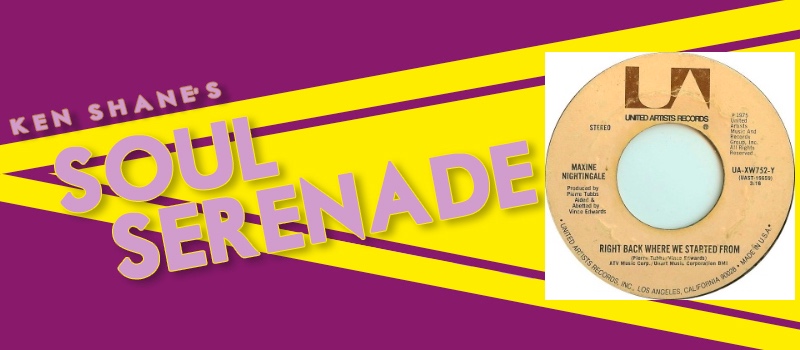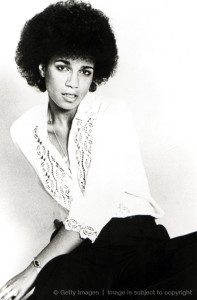 Soul music is not a genre that is restricted to music coming out of Detroit, Memphis, Muscle Shoals, or other American cities. Great Britain can not only lay claim to great soul artists, but also continues to support soul artists who might have flown under the radar. Many is the career that has been revived by an artist taking his or her act to England, and the Northern Soul movement there continues to champion long forgotten, but nonetheless deserving artists.
Soul music is not a genre that is restricted to music coming out of Detroit, Memphis, Muscle Shoals, or other American cities. Great Britain can not only lay claim to great soul artists, but also continues to support soul artists who might have flown under the radar. Many is the career that has been revived by an artist taking his or her act to England, and the Northern Soul movement there continues to champion long forgotten, but nonetheless deserving artists.
Maxine Nightingale didn’t have to take her act to the U.K. She was born in Wembley, and started singing with bands when she was in school. The first break she got came when a band called Unisound heard her sing, and invited her to join them on a cabaret tour. One of the venue managers on that tour liked what he heard, arranged for Maxine to make a demo, and got her signed to Pye Records.
Maxine released three singles for Pye between 1969-1971, but none of them gained any traction. In the meantime, Maxine started a theater career, performing in the West End production of Hair. During that run, an actor from the German production of Hair came to see the London production, and he and Maxine began a relationship. She moved to Germany where she appeared in the German version of Hair, as well as in Jesus Christ Superstar, and Godspell. Maxine gave birth to a daughter in 1973.
The family returned to London, where Maxine appeared in Savages, after which she withdrew from performing in order to raise her daughter. She found work as a session singer because she found she was able to go out and work at night while the baby was sleeping. One of the records she sang on was called “Fool,” by Al Matthews. The producer of that session, Pierre Tubbs, was impressed with Maxine’s singing and asked composer J. Vincent Edwards (who had appeared with Maxine in Hair) to co-write a song with him for Maxine to record.

The song that Edwards and Tubbs came up with was “Right Back Where We Started From.” But Maxine wasn’t really interested in restarting her recording career, and initially declined the offer. Eventually she agreed, but only if the single was released under a pseudonym. She had to be convince to accept a royalty deal rather than a session singer fee for the recording.
“Right Back Where I Started From” was a song that Edwards had laying around for a couple of years. He and Tubbs finished it in seven minutes while driving to a hospital where Tubbs’ wife was about to have a baby. The song was recorded, as a demo, in a small studio in Camden Town. The session musicians included Mike de Albuquerque on bass, and violinist Wilfred Gibson (who also did the string arrangement). Both had been members of the Electric Light Orchestra. Tubbs played guitar, and Edwards played percussion.
In an interview, de Albuquerque insisted that it was a demo session like any other. The musicians recorded two tracks for Maxine, and two for another artist, all in a three hour session.
“Let me stress, it was a demo session that this multi-million selling thing came out of, it wasn’t let’s go and remake it. It was the original demo session — that multi-million selling recording, I would think, cost [Tubbs] less than a £100 if you put the other tracks into the pudding,” du Albuquerque recalled.
Whatever the circumstances were, the record was released by United Artists (under Maxine’s real name) in England within two weeks of being recorded. By November 29, 1975, it was #8 on the U.K. Singles chart. The single was released by U.S. in January, 1976, and shot up to #2 on the Billboard Hot 100 by that spring. “Right Back Where We Started From” never made it to #1 on the Billboard chart, but did top both the Cash Box and Record World charts.
Maxine had another major hit, but only on the U.K. chart, in 1977, “Love Hit Me” made it to #11 on the U.K. Singles chart. She did return to the U.S. charts when “Lead Me On” topped the Billboard Easy Listening chart in 1979, and reached #5 on the Hot 100. Unfortunately, Maxine was unable to find a successful follow-up. “(Bringing Out) The Girl in Me” only managed to get to #73, marking her last Top 100 record.
Maxine was not done yet though. In 1982 she duetted with Jimmy Ruffin on “Turn to Me,” and the record was an R&B hit. She faded from the pop scene after that, becoming more of a jazz vocalist. These days she continues to tour on the oldies circuit, performing in shows that feature ’70s artists.





Comments